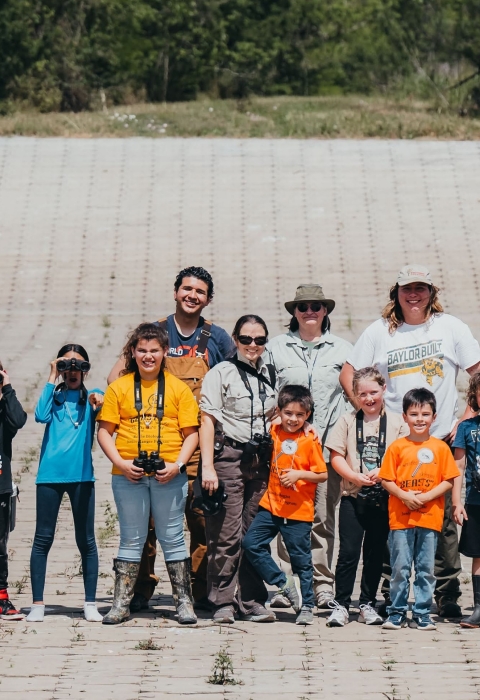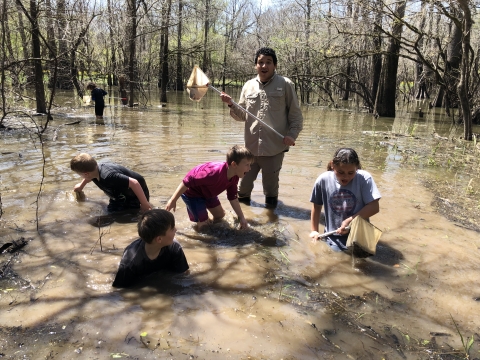The introduction letter to parents of children enrolled in the "Be the Biologist" Junior Ranger Program at Trinity River National Wildlife Refuge makes one thing very clear: don't be surprised if your child comes home looking like a “piglet that has been rolling in mud.”
“If your kid does not come home with a dirty face, well, they haven’t been proper field biologists,” said U.S. Fish and Wildlife Service Refuge Biologist Laurie Lomas Gonzales.
True to her word, the hands-on field biology and park ranger program that she and her team created is producing a cadre of muddy, conservation-minded third through fifth graders in Liberty County, Texas.
The idea for the program came to Gonzales when Liberty Independent School District moved to a four-day school week in Fall 2021. A certified Texas Master Naturalist and fish and wildlife biologist, Gonzales saw the open day in the school schedule as an opportunity to help get the next generation involved in insect and pollinator conservation.
“I thought as a biologist I can share what I know and start spreading the word in a way that kids can understand and get excited about,” Gonzales said.
During the 10-week program, which meets every Friday during the Fall and Spring semesters of the school year, children learn to perform the career of a biologist. This includes public speaking and creating and exploring wildlife habitat, all while following a curriculum centered around conservation and advocacy for insects and pollinators.
But the learning doesn’t take place in a classroom. Gonzales encourages the children to learn about the environment by climbing trees, smelling flowers, hiking in the woods, and of course, rolling in the mud.
“When do kids actually have permission to jump into a puddle of mud?” Gonzales said. “Because usually someone is going to be there saying, ‘Don't get too close to that.’ I’m saying, ‘That’s why you’re here – go for it.’ A muddy kid is a happy kid.”
Field trips to the refuge and other locations in their community help the children learn about insects, their interdependence on plants, and how that connection influences the food web and themselves.
Puppets and games help keep the kids engaged, along with unique hands-on activities like collecting aquatic invertebrates to feed to Gonzales’ pet ducks, wearing “bug vision glasses” during night hikes to see how insects are affected by light pollution, and even pulling live grubs out of rotting acorns and learning how to cook and eat them.
But the program isn’t just about learning, it’s about taking action.
“We guide them in seeing what is lacking in the urban environment and ask them ‘Now what are we going to do about it?’” Gonzales said.
On Oct. 12, 2021 the children attended a Liberty City Council meeting to speak about what measures could be taken to improve insect, pollinator and monarch butterfly habitat, and voiced simple solutions that could be implemented at no cost to the city. It made such an impact that Mayor Carl Pickett signed the National Wildlife Federation’s Mayor’s Monarch Pledge and proclaimed Feb. 8, 2022 as “Mayor’s Monarch Pledge Day” in the City of Liberty.
And they didn’t stop there.
The children also visited the Liberty Independent School District (ISD) board meeting to express what they had been learning, thank them for an outdoor learning classroom that was created for the program, and ask for permission to create insect habitat on school grounds.
“Recently I’ve noticed the[re] [aren’t] many native plants and animals in Liberty ISD,” wrote fourth grader Hutton Evans in their speech to the board. “Me and some other kids want to make change. We ask you to please set aside land for native plants and animals.”
It worked. After speaking to the board, the children received permission to plant a half-acre of wildflower habitat in a retention pond on school grounds and plant native trees on the property.
While the goal of the program is to teach students about insects and habitat, and to take action to improve insect habitat in their community, school, and backyards, the experience also helps bring more awareness of the refuge to the community and the family members of the children who attend the program.
“We encourage the parents to come, and we go kayaking, birdwatching, hiking, and we tell the parents to bring the whole family,” Gonzales said. “This is one more way of encouraging families to visit the refuge.”
Long-term, Gonzales said she hopes the program will help train future volunteers for the refuge and eventually inspire the next generation of leaders who can help take action to conserve nature in their communities.
“This starts the pipeline of getting these kids involved with the refuge and natural resources, and just getting involved and seeing what's out there,” Gonzales said. “I think it opens a lot of eyes.”
Gonzales said she’s already seeing the results. Since the program began, parents have told her stories about how their children are now identifying native butterflies during camping trips and encouraging their families to spend more time in the natural spaces that they learned to love.
“One parent told me that their child took the family back to a place we explored during the program,” Gonzales said. “It was the kid’s birthday and that is where they wanted to go celebrate. Isn’t that something?”
Partners who support the program by providing financial assistance and volunteers include Trinity River National Wildlife Refuge, the Service’s Houston Community Partnerships & Engagement Program, Trinity River Refuge Friends Group, Lower Trinity Basin Master Naturalists, the Lower Trinity Valley Bird Club, City of Liberty, and Liberty ISD High School.
Though there is a $50 registration fee to sign up for the “Be the Biologist” Junior Ranger Program, scholarships are available for children who need financial assistance. For more information or to sign up for the program, email Laurie_Lomas_Gonzales@fws.gov.







